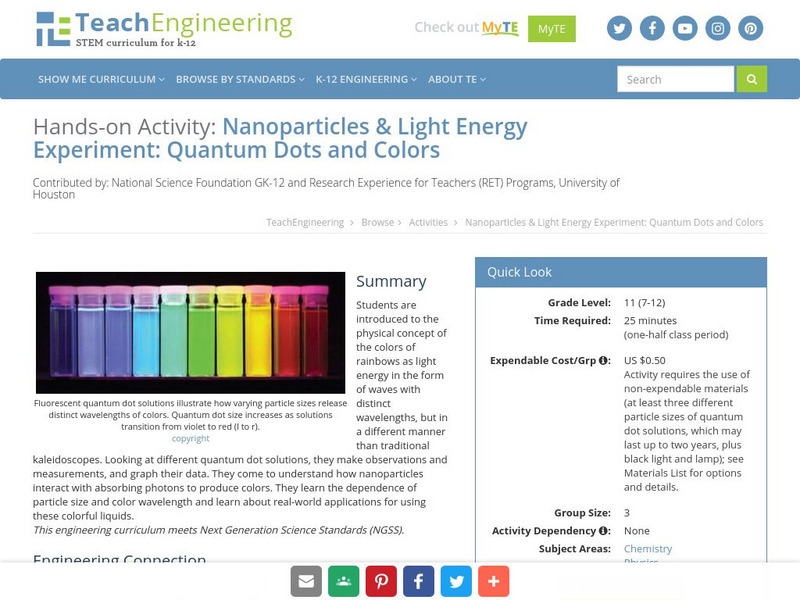Khan Academy
Khan Academy: Thermodynamics Article
Thermodynamics is a very important branch of both physics and chemistry. It deals with the study of energy, the conversion of energy between different forms and the ability of energy to do work. Through this article, you will begin to...
Council for Economic Education
Econ Ed Link: Blowing in the Wind
Wind energy is becoming a viable alternative to more traditional forms of energy generation. In this lesson, students will determine the feasibility of wind generation in different areas of the United States. Finally, students will...
University of Sydney (Australia)
Thermal Physics Module/heat Transfer 1 [Pdf]
The first of two pages discussing the different forms of thermal energy transfer. Equations expressing the rate of energy transfer by each of the methods are provided and discussed.
ClassFlow
Class Flow: Bicycle
[Free Registration/Login Required] In this flipchart the science of cycling is discussed. What makes the bicycle the most effective form of transportation today, what muscles are used while cycling, and different uses of energy are all...
PBS
Pbs Learning Media: Sources of Radiation
An interactive activity that discusses how radiation is like energy and comes in different forms.
Concord Consortium
Concord Consortium: How Can a Small Spark Start a Huge Explosion?
Students explore connections between electric forces and molecules using simulations, and explain energy transfers using conservation of energy. This concept will be explored in the following activities. Activity 1 What makes materials...
Globio
Glossopedia: Light
Light is a form of energy. We see it in many different forms all around us. It's the sunlight that pours through your bedroom window and wakes you up. Images and in-depth information on light can all be accessed in this article.
TeachEngineering
Teach Engineering: Environmental Challenges in China
Students learn about the wonderful and fascinating country of China, and its environmental challenges that require engineering solutions, many in the form of increased energy efficiency, the incorporation of renewable energy, and new...
American Chemical Society
Middle School Chemistry: Lesson Plans: Temperature Changes in Dissolving
Media-rich lesson in which students discover that it takes energy to break bonds, and that energy is released when bonds are formed during the process of dissolving. They also determine whether dissolving is either exothermic or...
TeachEngineering
Teach Engineering: Quantum Dots and Colors
Students are introduced to the physical concept of the colors of rainbows as light energy in the form of waves with distinct wavelengths, but in a different manner than traditional kaleidoscopes. Looking at different quantum dot...
CK-12 Foundation
Ck 12: Lewis Electron Dot Structures
[Free Registration/Login may be required to access all resource tools.] The following online tutorial describes how a covalent bond forms, including the energy change involved in the process.Students will be asked to use the octet rule...
Chemistry Collective
Chem Collective: Coffee Problem
In this activity, students use knowledge of specific heat capacity to mix together hot coffee and cold milk to create a solution of coffee at a desired temperature. In this randomized problem, each student is given a different final...
University of Arizona
University of Arizona: Problemas De La Fotosintesis. Bloque 1
In this module you will be able to test your understanding of how light energy is converted into different forms of chemical energy during photosynthesis, to review the equations for the light reactions of photosynthesis, and to explore...
Concord Consortium
Concord Consortium: Molecular Workbench: Self Assembling Lattice Structure
View this simulation to see how lattice structures are formed when particles of different shapes and charges form bonds.
NASA
Nasa Earth Observatory: Clouds & Radiation Fact Sheet
This article highlights facts about clouds and their role in the Earth's climate change.
NASA
Nasa Earth Observatory: Clouds in a Clear Sky
This article introduces the different layers of the atmosphere and the clouds that are formed there. Scientists use instruments such as the SAGE 11 that help to measure amounts of sunlight, water vapor, and other conditions that affect...




![Thermal Physics Module/heat Transfer 1 [Pdf] Handout Thermal Physics Module/heat Transfer 1 [Pdf] Handout](https://d15y2dacu3jp90.cloudfront.net/images/attachment_defaults/resource/large/FPO-knovation.png)








